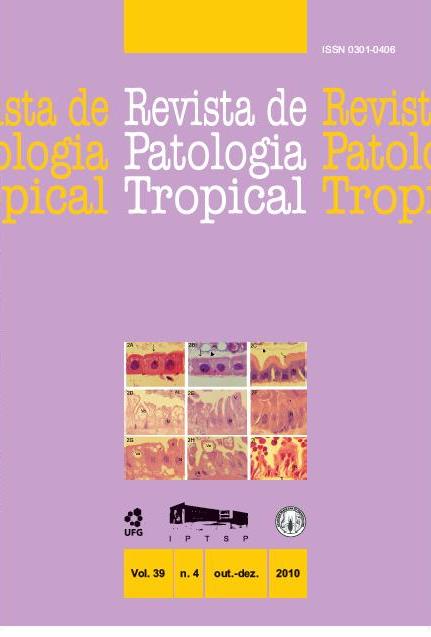Alterações morfo-histológicas em larvas de Aedes aegypti (linnaeus, 1762) (Diptera, Culicidae) causadas pelo tanino catéquico isolado da planta do cerrado Magonia pubescens (Sapindaceae)
DOI:
https://doi.org/10.5216/rpt.v39i4.13066Palavras-chave:
Aedes aegypti, Tanino catéquico, Magonia pubescens, Controle.Resumo
O controle do Aedes aegypti é hoje um dos grandes problemas de saúde pública no Brasil, por ser o principal vetor do dengue e da febre amarela urbana. De origem africana, este mosquito adaptou-se muito bem às condições climáticas brasileiras e se encontra distribuído em todos os estados. Os métodos usuais de combate e controle deste mosquito têm sofrido vários questionamentos. Os inseticidas químicos atualmente utilizados têm levado ao surgimento de populações resistentes de mosquitos, a consequente elevação de sua densidade já desencadeou grandes epidemias de dengue.Substâncias inseticidas de origem botânica podem ser candidatas alternativas ao controle. Este trabalho apresenta, pela primeira vez, as alterações morfo-histológicas causadas pela atividade larvicida do tanino catéquico, extraído de Magonia pubescens, nas larvas de A. aegypti, mostrando o potencial larvicida deste composto natural. Larvas de terceiro estádio foram submetidas ao tanino catéquico, a 37ppm, solubilizado em água, onde permaneceram por até 24 horas. As larvas que atingiram estado letárgico foram coletadas e fixadas em paraformaldeído a 4% em tampão cacodilato de sódio 0.1M pH 7.2, incluídas em resina, montadas em lâminas, coradas pela hematoxilina-eosina e analisadas por microscopia de luz. Os principais efeitos tóxicos celulares do tanino catéquico sobre larvas de A. aegypti foram: elevada vacuolização e ausência dos limites citoplasmáticos, formação vesicular apical com liberação de conteúdo citoplasmático, aumento do espaço intercelular e desprendimento de células da membrana basal.
Downloads
Downloads
Publicado
Como Citar
Edição
Seção
Licença
The manuscript submission must be accompanied by a letter signed by all authors stating their full name and email address, confirming that the manuscript or part of it has not been published or is under consideration for publication elsewhere, and agreeing to transfer copyright in all media and formats for Journal of Tropical Pathology.

